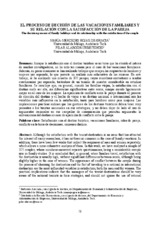Mostrar el registro sencillo del ítem
El proceso de decisión de las vacaciones familiares y su relación con la satisfacción de la pareja
| dc.contributor.author | Rojas de Gracia, María Mercedes | |
| dc.contributor.author | Alarcón Urbistondo, Pilar | |
| dc.date.accessioned | 2018-04-24T11:17:45Z | |
| dc.date.available | 2018-04-24T11:17:45Z | |
| dc.date.issued | 2017 | |
| dc.identifier.issn | 2530-7134 | |
| dc.identifier.uri | http://hdl.handle.net/10396/16509 | |
| dc.description.abstract | Aunque la satisfacción con el destino turístico es un tema que ha atraído el interés de muchos investigadores, no ha sido tan común para el caso de las vacaciones familiares. Además, en pocas ocasiones se han realizado trabajos que recojan las respuestas de hombres y mujeres por separado, lo que permite un análisis más exhaustivo de las mismas. En este trabajo, se ha analizado una muestra de 375 parejas, cuyos miembros contestaron a sendos cuestionarios por separado, tratándose de un tamaño de muestra considerable en estudios familiares. Se concluye que, en general, cuando las familias viajan, la satisfacción con el destino suele ser alta, sin diferencias significativas entre sexos, aunque siendo ligeramente mayor en el caso de las mujeres. La aparición de conflicto entre la pareja durante el proceso de elección del destino y el hecho de viajar a un destino nacional o internacional son las variables más influyentes en la satisfacción, tanto para hombres como para mujeres. Las implicaciones prácticas indican que los gestores de los destinos turísticos deben tener muy presentes a los turistas nacionales en sus estrategias, y no deben dejar de lado el uso de argumentos racionales en sus campañas de comunicación que permitan argumentar la conveniencia del destino en caso de aparición de conflicto entre la pareja. | es_ES |
| dc.description.abstract | Although the satisfaction with the tourist destination is an issue that has attracted the interest of many researchers, it has not been so common in the case of family vacations. In addition, there have been few works that collect the responses of men and women separately, which allows a more exhaustive analysis of them. In this work, we have analyzed a sample of 375 couples, whose members answered separate questionnaires, being a considerable sample size in family studies. It is concluded that, in general, when families travel, satisfaction with the destination is usually high, without significant differences between sexes, although being slightly higher in the case of women. The appearance of conflict between the couple during the process of choosing the destination and the fact of traveling to a national or international destination are the most influential variables in satisfaction, both for men and for women. The practical implications indicate that the managers of the tourist destinations should be very aware of the national tourists in their strategies, and should not ignore the use of rational arguments in their communication campaigns to argue the convenience of the destination in case of appearance of conflict between the couple. | es_ES |
| dc.format.mimetype | application/pdf | es_ES |
| dc.language.iso | spa | es_ES |
| dc.publisher | UCOPress | es_ES |
| dc.rights | https://creativecommons.org/licenses/by-nc/4.0/ | es_ES |
| dc.source | Revista Internacional de Turismo, Empresa y Territorio (RITUREM) 1(2), 71-87 (2017) | es_ES |
| dc.subject | Satisfacción con el destino turístico | es_ES |
| dc.subject | Vacaciones familiares | es_ES |
| dc.subject | Roles de pareja | es_ES |
| dc.subject | Conflicto en la toma de decisiones | es_ES |
| dc.subject | Consenso diádico | es_ES |
| dc.subject | Satisfaction with the tourist destination | es_ES |
| dc.subject | Family vacations | es_ES |
| dc.subject | Couple roles | es_ES |
| dc.subject | Conflict in the decision making | es_ES |
| dc.subject | Dyadic consensus | es_ES |
| dc.title | El proceso de decisión de las vacaciones familiares y su relación con la satisfacción de la pareja | es_ES |
| dc.title.alternative | The decision process of family holidays and its relationship with the satisfaction of the couple | es_ES |
| dc.type | info:eu-repo/semantics/article | es_ES |
| dc.relation.publisherversion | http://www.uco.es/ucopress/ojs/index.php/riturem/index | es_ES |
| dc.rights.accessRights | info:eu-repo/semantics/openAccess | es_ES |

